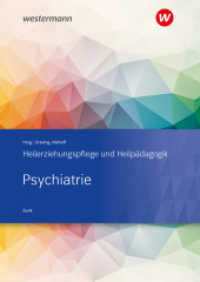Full Description
This incisive book explores the opportunities and challenges of implementing inclusive rule-making processes in international organisations (IOs). Expert authors examine the impact of inclusiveness across a wide range of organisations and policy issues, from climate change and peace and security to energy governance and securities regulation.
Chapters combine novel academic research with insights from IO practitioners to identify ways of making rule-making more inclusive, building on the ongoing work of the Partnership of International Organisations for Effective International Rule-Making. They utilise both qualitative and quantitative research methods to analyse the functions and consequences of inclusive rule-making; mechanisms for citizen participation; and the challenges of engaging with private actors and for-profit stakeholders. Ultimately, the book highlights key strategies for maintaining favourable public perceptions and trust in international institutions, emphasizing the importance of making rule-making more accountable, legitimate and accessible.
Academics and students in international law, political science, regulation and governance, organisational studies and international relations will greatly benefit from the innovative frameworks and empirical analyses presented in this book. It is also an invaluable resource for practitioners and policy-makers working in IOs, national governments and non-state stakeholders.
Contents
Contents
1 Inclusive rule-making by international organisations: Setting
the scene 1
Rita Guerreiro Teixeira, Marianna Karttunen, Aïda
Rahmouni, Axel Marx and Jan Wouters
PART I STAKEHOLDER ENGAGEMENT: OPPORTUNITIES
AND CHALLENGES FOR INTERNATIONAL
ORGANISATIONS
2 Stakeholder engagement and media perception among
international organisations 19
Ángel Saz-Carranza, Xavier Fernández-i-Marín, Marianna
Karttunen and Juan N. García-Nieto
3 Beyond participation: Meaningful engagement of non-state
actors in international organisations - lessons learnt from the
process to strengthen observer engagement in the UNFCCC 49
Emma Bertipaglia and Hayley Walker
4 Rule-making in the African Union: Current challenges and
the way forward 83
Femi Amao, Michele Olivier and Konstantinos D. Magliveras
PART II ENGAGEMENT WITH PRIVATE ACTORS
5 Private sector participants in international rule-making:
Governance models 108
Melissa J. Durkee
6 How should IOs engage with the private actors in global
climate and energy governance? 134
Kaho Yu, Xinchuchu Gao and Xuechen Chen
7 The involvement of private actors in transnational rulemaking: The case of securities regulation 154
Antonio Marcacci
PART III CIVIL SOCIETY AND CITIZENS' PARTICIPATION
8 Citizen participation in regional organisations: Perspectives
from their founding treaties 177
María Rodríguez Alcázar
9 Informal institutions and formalised non-state actor
engagement: Analysing G7 and G20 outreach processes 223
Diane Schumann
10 Digital public consultations: Lessons from the European Union 244
Kseniia Soloveva, Keith Prushankin, Hasan Akintug,
Florence Felsheim, Carolina Gerli, Nathalie Koubayova,
Cyprian Liske, Claudia Negri Ribalta and Jan Karol Farfal
11 Inclusive rule-making by international organisations: Lessons
learned and persisting challenges 275
Rita Guerreiro Teixeira, Marianna Karttunen, Axel Marx
and Jan Wouters






